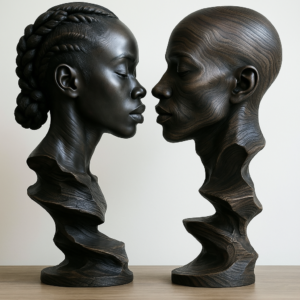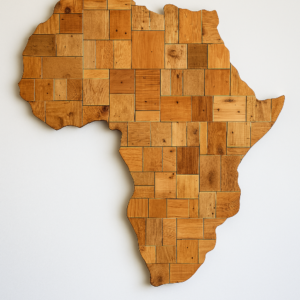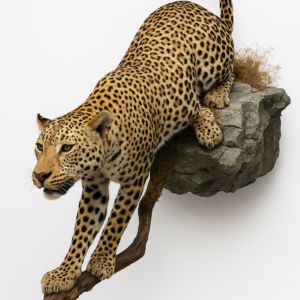“The Panther of Nightfall,” translated into Swahili as “ Mbogo Ya Usiku,” is a powerful, contemporary tribute rooted in the ancestral spirit of Africa and inspired by the iconic legacy of Wakanda’s protector—the Black Panther. This sculptural mask blends cultural heritage with futuristic vision, channeling the raw power of the panther while retaining the storytelling traditions and artistry found in African tribal mask-making.
Designed with sharp angularity, this mask echoes the spirit of the Ngil masks used by the Fang people of Gabon, known for their imposing facial forms used in ceremonies of justice and spiritual purification. But unlike traditional masks meant to appease or interrogate spirits, Mbogo Ya Usiku stands as a symbol of defiant sovereignty—a mask of leadership, of warrior lineage, and of sacred duty passed down through generations.
The mask is carved in the likeness of a panther’s face, its surface textured with deliberate, symbolic markings that mimic both tribal scarification and advanced armor etching. These markings are not decorative—they represent paths of protection, ritual scars of royalty, and spiritual circuitry, as if the ancestors themselves etched their codes into the bones of their guardian spirit. Each geometric line, carefully incised, pays homage to ancient traditions while boldly declaring readiness for the battles of the present.
The fierce, feline eyes are carved into sharp almond-shaped slits that exude vigilance and restraint. They are deep-set, hollow, and slightly angled to radiate a stealthy awareness, embodying the legendary agility and foresight of the panther. Below them, the snarling snout merges seamlessly into a wide, gaping mouth—home to four pronounced, gleaming white fangs, each precisely shaped like ceremonial daggers. These teeth mark the fusion of the animalistic and the spiritual—the power to defend, destroy, and protect the sanctity of one’s lineage.
The mask’s color is a deep obsidian-black with undertones of forest green, signifying a presence that lives between earth and shadow. The finish is subtly reflective, absorbing light to reveal the intricacy of its surface—each scale-like detail capturing movement and meaning. Light etchings in gold line the crest and sides of the face, forming warrior glyphs reminiscent of traditional African divination patterns. These add mysticism to the mask’s strength—suggesting it is not only a tool of protection but a totemic interface with the unseen world.
Mounted on a round wooden base, which mimics the appearance of a woven reed mat, the piece honors the ancestral craftsmanship of basketry and grounding rituals. The stand is subtle, designed to elevate the mask to eye level without distraction, mimicking how such objects would be raised during invocation or rite.
While Mbogo Ya Usiku is not an artifact from a specific tribe, it is imbued with the pan-African spirit of futurism—a celebration of identity, resilience, and cultural elegance in the face of adversity. In the modern world, this mask sits at the intersection of Afrofuturism and heritage reclamation. It does not mourn the past—it carries it forward with strength, reinterpreting African aesthetics through the lens of Wakandan philosophy: tradition merged with technology, loyalty bonded with leadership.
Whether displayed in a home gallery, museum collection, creative studio, or leadership space, Mbogo Ya Usiku offers more than aesthetics—it offers presence. Its fierce gaze, sacred geometry, and mythic symbolism awaken the viewer to protection, legacy, and justice. It reminds us that in the quiet of night, when the world sleeps, a guardian always watches—sharp, silent, and sacred.





Reviews
There are no reviews yet.